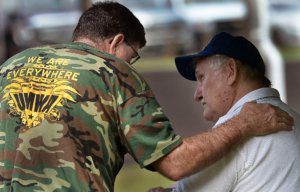Source: Charleston Gazette-Mail
Publishing Date: September 4, 2017
RACINE, W.Va. — Even though their years in the coal mines of Southern West Virginia are well in the past, Jerry Bell and Curtis Akers said Monday they still worry about the future of miners who don’t have the advocacy of a union.
Bell, of Logan, and Akers, of Boone County, stood under a tent at the 79th annual United Mine Workers of America Labor Day Celebration on Monday. They listened to speeches from politicians and music from across the state while they discussed the past work and future battles in their ongoing war to secure wages, health care, retirement and overall well-being in the Mountain State.
“Right now, we’ve been having a big battle for years about our health care,” Bell said. “We were promised health care back in 1946 from the government, and through a series of calamities, they were cutting a lot of people off. We kept fighting for it. Now, we’ve got health care, but the battle’s not over.”
About 1,000 union members, their families and local and state politicians came to John Slack Memorial Park, in Racine, as part of the annual celebration that is equal parts friendly reunion and campaign event, said Boone County Circuit Clerk Sue Ann Zickafoose.
“They come to talk about the industry, about mining,” Zickafoose said. “They talk about being unionized. What I think people take away from this is that they have better days ahead of them. They’ve got a hopeful voice about them.”
Zickafoose said this year’s crowd was on the smaller side, since it’s not an election year. She also attributed lower union membership from the downturn in the coal industry and the expansion of non-union mines.
The U.S. Bureau of Labor Statistics reported in January that union participation nationwide decreased by 0.4 percent between 2015 and 2016. About 866,000 people worked in the mining, quarrying and oil and gas extraction industries in 2015, and that number decreased to 765,000 in 2016, according to the bureau’s statistics. The number of union members in those industries decreased by 4,000 in the same time frame.

Brian Lacy, international representative for the UMW, said the downturn of unions in West Virginia is connected to the passage of prevailing wage and right-to-work laws by the West Virginia Legislature in 2015.
“[Right-to-work] is designed to divide membership and try to weaken labor organizations,” Lacy said. “They pretty it up with a pretty slogan and make it sound like they’re out there fighting for workers’ rights, but really, it’s the opposite.”
Sen. Ron Stollings, D-Boone, described the picnic as being part of Boone County’s heritage, and he also brought up the prevailing wage and right-to-work laws.
“All the things organized labor feels is necessary basically is gone now,” Stollings said. “These people who are working non-union are working for less salary and less benefits.”
Fayette Smith, of Boone County, sat in the shade with her back to the Big Coal River as she talked about how her husband worked in the mining industry. She said she’s concerned about the loss of wages among those working in non-union mines today.
“[The non-union mines] take and bribe these people to work for them, putting money out in front of them,” Smith said. “In the long run, they’re stealing everything they have from them as they get older. Whereas, in the union, it’s the opposite.”
After singing for the crowd, Del. Mike Pushkin, D-Kanawha, said people in the coal mining industry are “good, honest, hardworking people.”
“People like to know that they’re not going to have to declare bankruptcy over being sick,” Pushkin said. “They like to know that, when they go to work, they have a safe workplace. They need a job to go to.”
Smith said she worries about the safety of people, including her son, who work in the mines.
“They’re out there to make money, these non-union mines,” she said. “All of the coal mining industry is for money, but if you don’t have safety, and you keep running through people, pretty soon you’re not going to have workers. They’re going to be gone, because you killed them all.”
There have been 12 mining deaths in the United States in 2017, according to the U.S. Mine Safety and Health Administration, and six of those were in West Virginia.
Sen. Richard Ojeda, D-Logan, said it is up to lawmakers to not cave in to threats from lobbyists for the coal industry while working for the rights of union workers.
“Unions are the voice of our working-class people,” he said. “The moment the union loses their voices, we go back to slavery in West Virginia. That’s a fact. Make no mistake about it, when they are successful in doing away with the UMWA and the other unions, then the working person has no voice.”
Reach Lacie Pierson at lacie.pierson@wvgazettemail.com, 304-348-1723 or follow @laciepierson on Twitter.

